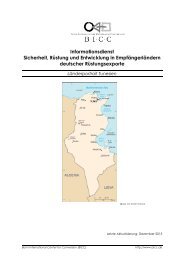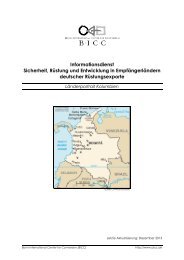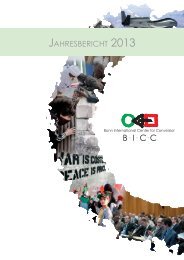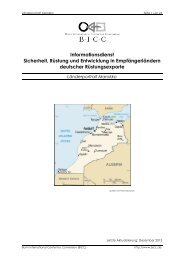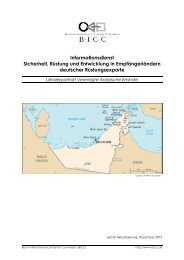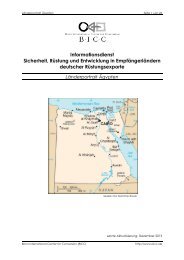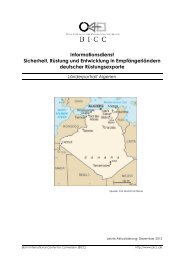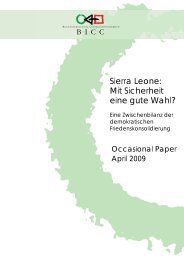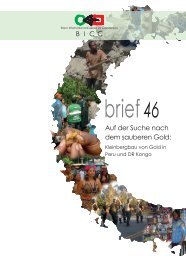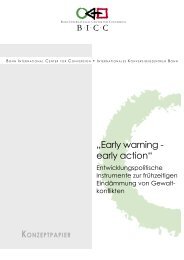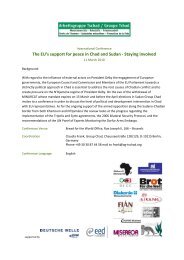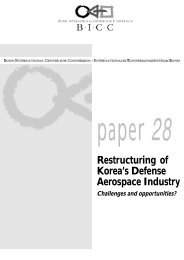English - BICC
English - BICC
English - BICC
Create successful ePaper yourself
Turn your PDF publications into a flip-book with our unique Google optimized e-Paper software.
in the process, the Irish government.<br />
An underlying necessity within the<br />
process dictated that the two<br />
governments must be seen to be<br />
moving together in the same direction<br />
as much as possible. Any diplomatic<br />
impasse in British–Irish relations<br />
filtered down into the Northern Irish<br />
parties and made progress especially<br />
difficult. An Irish resuscitation of the<br />
earlier Unionist idea of establishing an<br />
international body to examine the<br />
question of decommissioning was<br />
consequently accepted by the British at<br />
the end of June in 1995.<br />
Although Britain may have harboured<br />
suspicions that an attempt was being<br />
made to side-step the issue by pushing<br />
it down a separate track, this was less<br />
important than being seen to be<br />
moving jointly with the Irish<br />
government away from an extended<br />
impasse (Finlay, 1998, p. 289). An<br />
“almost wholly agreed” deal between<br />
the British and Irish governments on<br />
the remit of an international body and<br />
its connection to the Washington 3<br />
Test, began to emerge in the autumn<br />
of 1995 (Irish Times, 6 September<br />
1995).<br />
Decommissioning<br />
goes international<br />
A commission, to be chaired by the<br />
former US Senate leader George<br />
Mitchell would be established to deal<br />
with paramilitary decommissioning but<br />
its remit would be confined to<br />
soliciting willingness in principle to<br />
decommission and examining the<br />
necessary practicalities of carrying that<br />
out—in other words Washington 1 and<br />
2. A fudge on Washington 3 was to be<br />
agreed in that, although bilaterals and<br />
trilaterals between the governments<br />
and Sinn Fein could take place, allparty<br />
substantive negotiations would<br />
only take place when the “appropriate<br />
conditions” had been met. However,<br />
replacing the blunt criterion of<br />
Washington 3 with a vague reference to<br />
“appropriate conditions” was not an<br />
effective way of baiting the hook,<br />
particularly given that the British<br />
government reserved its right to<br />
publicly proclaim that prior<br />
decommissioning was still a necessary<br />
test for Republicans. Peace processes<br />
thrive on semantic fudges, but not<br />
when they are accompanied by blunt<br />
restatements of what was meant to<br />
have been fudged.<br />
The British–Irish summit meeting in<br />
September, at which a joint agreement<br />
on an international commission to deal<br />
with decommissioning would have<br />
been announced, was cancelled at the<br />
last minute by the Irish government<br />
after officials ultimately failed to<br />
overcome outstanding differences. If<br />
the British felt that they could not<br />
explicitly retreat from the demand for<br />
prior decommissioning for fear of a<br />
Unionist evacuation from the process,<br />
the Irish had become aware that<br />
Republican anxiety about the planned<br />
fudge, and Irish compliance in it, could<br />
actually jeopardise the ceasefire itself.<br />
The shepherds could move no faster<br />
than their respective flocks. However,<br />
both governments’ need to maintain a<br />
progressive working relationship and<br />
their desire to court American<br />
influence in the process, pushed<br />
discussions on the establishment of an<br />
international decommissioning body<br />
forward.<br />
The idea of a twin<br />
track approach<br />
A Joint Communiqué issued a scant<br />
two days before President Clinton’s<br />
visit to Northern Ireland on 30<br />
November 1995 formally launched the<br />
beginning of a twin track process. The<br />
main ingredients of the initiative<br />
included the “firm aim” of both<br />
governments to achieve all-party talks<br />
by the end of February 1996; the<br />
opening of “intensive preparatory<br />
talks” in which all parties would be<br />
B·I·C·C<br />
origin of the issue<br />
invited on equal basis; and the setting<br />
up of an international body to conduct<br />
an “independent assessment” of the<br />
decommissioning issue. The body’s<br />
purely advisory brief would include<br />
establishing the commitment of<br />
paramilitary groups to the principle of<br />
decommissioning and working out “a<br />
suitable and acceptable method for full<br />
and verifiable decommissioning” (Irish<br />
Times, 29 November 1995). The<br />
International Body comprised former<br />
US Senator George Mitchell as<br />
chairman, the former Prime Minister<br />
of Finland, Harri Holkeri, and the<br />
former Canadian Chief of the Defence<br />
Staff General John de Chastelain.<br />
Although a target date for substantive<br />
talks had been announced in this<br />
package—something which was<br />
designed to ameliorate Nationalist and<br />
Republican anxiety—the crucial test of<br />
Washington 3 remained unaffected by<br />
the initiative. As John Major said: “We<br />
haven’t changed our position on<br />
Washington 3. We won’t be asking the<br />
international body to question that<br />
position” (ibid.).<br />
The Communiqué was something of a<br />
fudge, in that both governments had<br />
trumpeted what had never been in<br />
dispute between either of them, and<br />
had agreed to disagree on the rest.<br />
Such was the nature of the process that<br />
it was important to be seen to be<br />
moving ahead together, even if activity<br />
was designed as much to distract<br />
attention from obstacles as find a way<br />
round them.<br />
British strategy:<br />
Picadorism or the<br />
creation of room to<br />
manoeuvre?<br />
Republican opponents of the British<br />
strategy on decommissioning felt that<br />
the British had either “no strategy” and<br />
were simply operating under “short<br />
term” considerations (An Phoblacht, 31<br />
August 1995) or were using the issue as<br />
a form of psychological warfare to sow<br />
confusion within the Republican base<br />
(Irish Times, 21 April 1995). Even<br />
17



